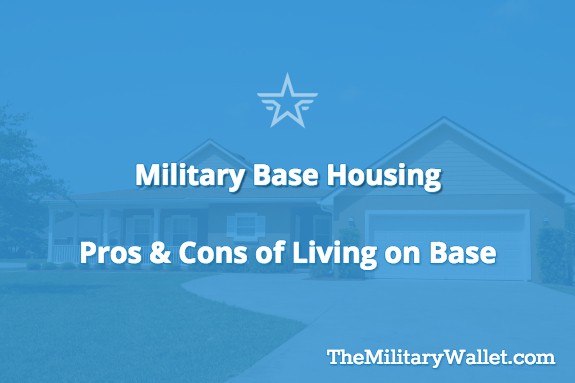Every time a military family gets Permanent Change of Station (PCS) orders to a new base, they face an important question: Where to live? All married service members receive a Basic Allowance for Housing (BAH) to cover their rent. Military families can choose to:
- Live on base in government housing for little to no cost and not receive BAH.
- Live off-base by renting or buying any property they choose and applying the BAH towards housing costs.
There is no magic answer for which solution is best. Let’s discuss the pros and cons of living on base in military housing.
How Does On-Base Housing Work?
Service members have several military housing options, but on-base housing will either be government-owned or privatized. The Department of Defense manages government-owned base properties. If you choose to live here, you don’t have to take action to pay rent. Instead, your BAH is automatically applied to your rent and most utilities. You will need to buy renter’s insurance on your own.
Privatized housing is owned and maintained by private companies with which the government contracts. The company serves as your landlord and manages the property. You will receive BAH in your paycheck, which will be used to pay your rent. However, you may be expected to pay your utilities and other renter costs, such as insurance.
Types of Base Housing
Military members also have different base housing options based on their family status. Junior service members may be required to live in base housing, which usually takes the form of barracks, dorms, or apartments. Service members with dependents are eligible for family housing, which is generally a single-family home, a townhome, or an apartment.
Single Housing: Barracks, Dorms, & Apartments
Single or unaccompanied service members may live in barracks, which are also rent-free. Many installations offer private rooms that resemble college dormitories. However, some troops may be required to share rooms or bathrooms.
Living on base is often required for junior service members within certain ranks. Check with your military branch and installation policies for rules that may apply to you.
Family Housing: Single Family Homes & Apartments
Service members who have dependents living with them are eligible for family housing. The availability of family housing varies by location. Some installations feature single-family homes, while others may offer townhomes or apartments.
Military Housing Overseas
Overseas duty stations typically have some base housing available if you want to live on base. Base housing on overseas military installations is designed to be similar to homes in America. For example, it may feature American-style electric outlets and voltage and have American-style bathrooms. Some overseas base housing is larger than you may find off-base.
However, the living arrangements on overseas military bases can be quite different from what one is used to in the U.S. Housing may be limited, and the strict rules and regulations can take some getting used to.
Military families stationed overseas may be able to live off-base in the surrounding area. Instead of BAH, they receive an Overseas Housing Allowance (OHA), which is calculated by rank to cover housing based on local prices in that country.
Unlike BAH, you can’t pocket any savings from your OHA. Service members stationed overseas must bring their rental agreement to the base housing office, which will cap their OHA based on their lease agreement.
Members also receive a utility allowance to cover the cost of any utilities not included in their rental agreement. If you don’t spend the full amount of your utilities allowance, you may keep any savings.

Check your VA Home Loan eligibility and get personalized rates. Answer a few questions and we'll connect you with a trusted VA lender to answer any questions you have about the VA loan program.
Benefits of Living On-Base
- Safe, gated neighborhoods: Nothing is more secure than a military facility with 24-hour gate guards! There may still be petty theft and some crimes on military bases, but very few violent crimes.
- Family-friendly environment: Everything on base is designed to help military families. If you have children, you will fit right in and find this very convenient.
- Few bills: You will not pay for rent, water, sewer, or trash pickup on-base. You only pay electricity if your bill goes over the average range.
- Maintenance is free: Having maintenance through the housing office is a life-saver during deployments. They fix everything, from water leaks to broken appliances to missing light bulbs.
- Kids can walk to school and playgrounds: On-base housing is usually in close proximity to several amenities. You’ll get more exercise by walking or biking to friends’ houses instead of driving.
- Gym, swimming pools, and other base activities: Bases include these amenities for free in most neighborhoods.
- Shorter commute for the service member: Living on-base puts you within a few miles of your military member’s work. That makes it more likely they will come home for lunch or be home in time for dinner.
- Built-in social community: Military bases are a tight community, and there is always someone willing to help if you need it. Neighbors will typically be of a similar rank or family size, so you automatically have a few things in common. Plus, you can use the Recreation Checkout.
- Family can survive with one car: Since most neighborhoods are within walking or biking distance to the Commissary, PX, and gym, a stay-at-home parent doesn’t always need a 2nd car.
- Convenient shopping at the Commissary and Exchange: Shopping at the Commissary and Exchange is easy and convenient and can save you money compared to shopping off-post.
Disadvantages of Living On-Base
- Lose all BAH: Since BAH is taken to cover rent and average electrical use, you won’t see any of it, even if the service member gets promoted.
- Fewer choices: Many base houses are simple and do not include fancy amenities. Based on the service member’s rank and number of dependents, you will be assigned a neighborhood and home. You can turn down a house, but only once or twice.
- Long waiting lists: Some base neighborhoods have military housing waitlists that last six months to 1 year. If you want to live on base, you should apply for housing as soon as you get orders.
- May pay more for electricity: The RECP energy billing program uses “neighborhood averages” to compute your electric bill. Some military families on-base may pay much higher bills than average families off-base.
- “Fishbowl” effect: On-base, everyone knows each other’s business. This can lead to drama and tension.
- Never really get away from work: The service member may be surrounded by co-workers and superiors, even when they come home. For some people, this makes it difficult to feel relaxed on base.
The Bottom Line
Choosing to live on a military base takes careful consideration. The right choice comes down to your specific finances and preferences. Try making your own pros and cons list or contacting a military friend who has lived on base.
Comment below your on-base housing experience: What did you enjoy or dislike?




Comments:
About the comments on this site:
These responses are not provided or commissioned by the bank advertiser. Responses have not been reviewed, approved or otherwise endorsed by the bank advertiser. It is not the bank advertiser’s responsibility to ensure all posts and/or questions are answered.
Danielle says
Not all overseas bases provide on base housing. Aviano, Italy for example does not, and a lot of other smaller bases work the same way.
Leah says
I got married on base last Saturday. My partner handles paperwork for the army and we live on base. I dislike the limited options. But it cannot be helped.